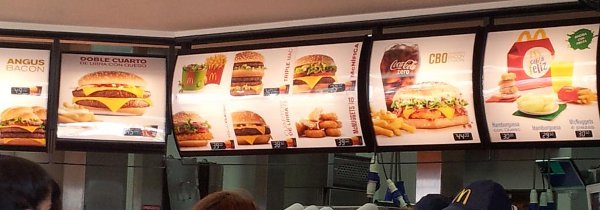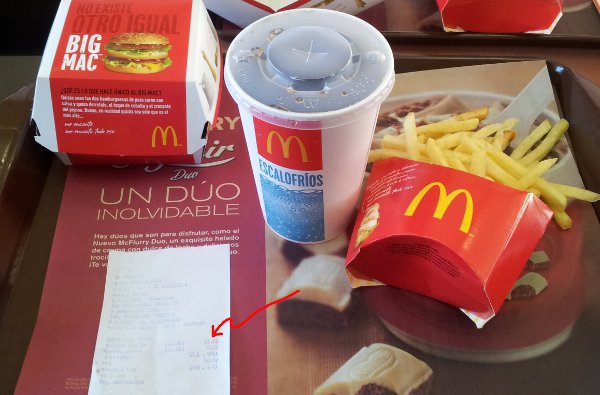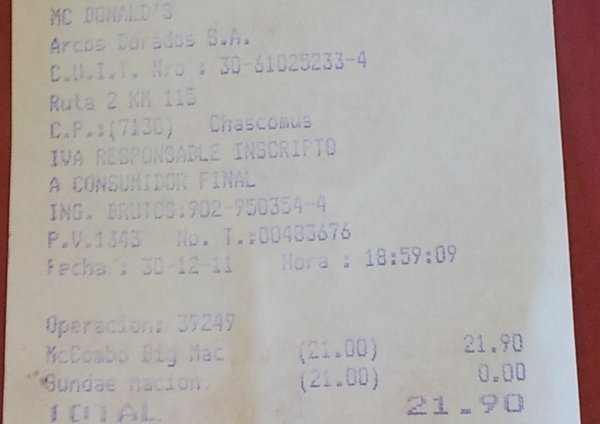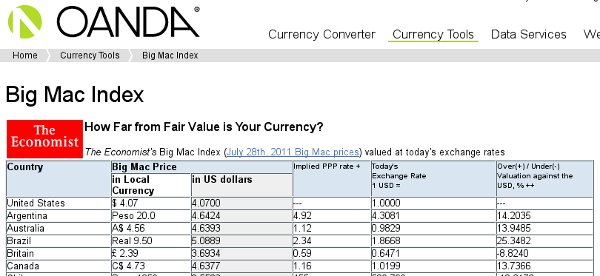Combo-economics at work in Argentina, or how to get a cheap Big Mac thanks to The Economist
By Roberto Di Cosmo on Saturday, December 31 2011, 14:37 - Economie - Permalink
Traveling in Argentina, I happened to stop by a MacDonalds. That might seem a silly thing to do in a country where you can have a fantastic piece of prime grilled beef for the price of a typical, lousy Mac combo, but I was just looking for a quick coffee on the route. It turned out that the highly overpriced cup of coffee was lousy too, but the day was not completely lost: I just found out another mind boggling example of the creativity of the people in this country. Bear with me for this short journey from a MacDonalds to finance mangling...
Waiting in the queue, I had a look at the prices of the different combos offered at this MacDonalds, and here is a picture that I took over the counter

Surpise, surprise ...
There were a couple of surprises, that you can check with me
- on one side, at an average of 40 pesos (that makes over 9 US dollars, and over 7 Euros!!!) the burger appears incredibly expensive, for a country where, until a few years ago, there was a cow for every two human beings;
- on the other side, I was quite puzzled when I noticed that THE MacDonalds product, yes, the (in)famous Big Mac, was actually missing from the menu!
... the missing Big Mac is a ... Big Deal!
Marcelo Spak, who was traveling with me, explained to me that it was very well possible to ask for a Big Mac, and actually, that was a terrific deal, at 21 pesos for the full menu.
Incredulous, I went back to the counter and ordered a Big Mac menu... here it is in the picture!

The price is actually 21.90 pesos... to make sure you agree with me, here is a close up of the ticket (and yes, I also got a free sundae, thanks to a "La Nacion" card from a friend).

Combo-economics at work...
What is going on here? How can a much smaller combo be advertised at twice the price of the Big Mac, which is not advertised at all? Is it another instance of the old strategy used in Argentina to charge more the casual tourist, while all the locals get the cheap deal?
Well, not really... it seems that the real answer can be found looking at the Big Mac Index introduced by The Economist something like 15 years ago.
Quoting The Economist itself:
The Big Mac index is based upon the theory of purchasing-power parity (PPP), the notion that a dollar should buy the same amount in all countries...
Our “basket” is a McDonald’s Big Mac, produced in 110 countries. The Big Mac PPP is the exchange rate that would leave hamburgers costing the same in America as abroad. Comparing actual rates with PPPs signals whether a currency is under-or overvalued.
Tweaking combo-economics
Nice! By comparing the price of a very common good, the Big Mac, The Economist suggested that one can compare actual consumer purchasing power... and you might even predict the future exchange rate between currencies using it. This idea (that I would not be surprised if it started out as a joke) got so popular that you even find expensive books published on this idea.
Well, but here is the trick: when a prestigious journal publishes indexes that suggest currency exchange rate adjustment based on such a minimal evidence as the price of a single good (no matter how popular), it is quite natural that governments get tempted to fix the price of this single good as they see fit. And the Argentinian government has already the power of fixing prices of essential goods (some beef cuts have had 'government prices' in the supermarket ever since the 2001 crisis).
By fixing the price of the combo to something around 20 pesos, the Argentinian government managed to make the Argentinian peso look not that much over-evaluated w.r.t. the dollar (just 14% last July) :

While, of course, at 40 pesos, which is its market price, the Big Mac index would go through the roof, and with it, the exchange rate, and the cost of the interest on the government bonds, and the estimate of the rate of inflation, etc. etc.
Stocktaking
Bearing with me up to this point, you have got two interesting pieces of information:
- if you travel to Argentina on a budget, then asking for a Big Mac combo might save you a few bucks (but I strongly advise you to spend a few more and get a delicious "bife de chorizo" instead)
- if you wonder how broken may be the view of the global economy that financial analysts have, you have got here another juicy data point.
As I love to say with some friends, human beings are not particles of a gas, and it may be quite risky to apply to them "laws of economics" as a physicist applies "laws of physics" to a gas... especially when the human beings under consideration are from Argentina :-)
Comments
Wow, that's interesting. Nice article, thank you.
As an Argentinian I'm embarrassed about this, but it is completely true. The big mac is a hidden menu to keep the index in place.
More information on this combo-tweaking is available in the Economics supplement of "El Clarin", that you can read here: www.ieco.clarin.com/econo...
A short summary: there has been a negotiation between McDonalds and the government in Argentina: in exchange for the BigMac price being slashed in half, McDonalds does not pay customs for the little plastic toys imported from China.
An yet, with all this, the Argentinian BigMac is one of the most expensive of the planet!
A few days ago the price of the Big Mac here in Argentina raised to about $26.5 pesos! thats like 6 USD or 5EUR!